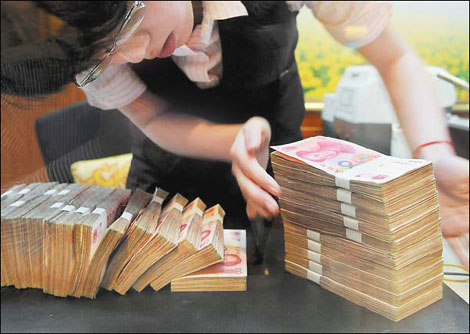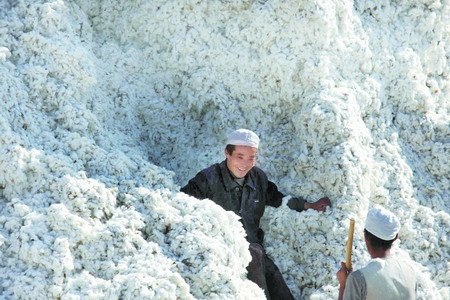Economy
Cautious monetary policy urged
By Li Xiang (China Daily)
Updated: 2010-11-03 09:22
 |
Large Medium Small |
|
 |
|
A China Merchants Bank employee counts yuan banknotes at a branch in Hefei, capital of Anhui province, on Oct 20. [Photo/Reuters] |
Central bank adviser warns of inflationary pressure, asset bubbles
BEIJING - China should shift its monetary policy toward a "cautious" stance to combat high inflationary pressure and the risk of asset bubbles, central bank advisor Li Daokui said on Tuesday.
"Once the economic downturn is contained and growth stabilizes, China should consider shifting from the current moderately loose monetary stance to a prudent or even cautious one," Li said at a financial forum in Beijing.
His comments come at a time when the market is speculating that the central bank may further tighten its monetary policy by raising interest rates once more before the end of the year to curb inflation and asset bubbles.
The central bank said in a monetary policy report released on Tuesday that uncertainties about price trends were increasing and it will improve liquidity management to ensure appropriate bank credit growth.
It also said it will gradually normalize monetary policy from its center-crisis mode while vowing to continue to follow a "moderately loose" stance.
Li echoed the central bank's stance and warned that the biggest risk in China's economy is fast-rising asset prices caused by the massive amount of liquidity in the economy which could lead to systemic financial risks.
"China's money supply is already the largest globally," he said. "Such a massive amount of liquidity could inevitably lead to asset bubbles and damage the health of the country's financial institutions."
China's broad measure of money supply, M2, rose 19 percent in September from a year earlier to 69.64 trillion yuan ($10.42 trillion), more than double the 2009 GDP of 34.05 trillion yuan.
Li called on policymakers to use the country's securities market to absorb the excess liquidity in the banking system. He also suggested the government divert part of the foreign reserve to the private sector through overseas investment.
China's massive amount of liquidity has formed over the past two years as a result of the 4 trillion yuan stimulus program initiated by the government to prop up the economy following the global financial crisis.
The recent round of quantitative easing in the United States is also believed to have caused "hot money" flows to emerging markets, including China.
The central bank in October raised the benchmark interest rate by 25 basis points for the first time in nearly three years after the consumer price index (CPI) rose 3.6 percent in September from a year earlier.
Although analysts expect China's CPI to edge even higher in the rest of the year, Yao Jingyuan, chief economist of the National Bureau of Statistics , said that the country would be able to contain consumer price growth at an average of 3.5 percent or less.
In the meantime, Li expected appreciation pressures on the yuan to ease as China's trade surplus is likely to fall to 220 billion yuan this year, about 4 percent of GDP.
"It will greatly ease the appreciation pressure of the yuan if the trade surplus continues to fall to 2 or 3 percent in the coming years," he said.
Reuters contributed to the story.




